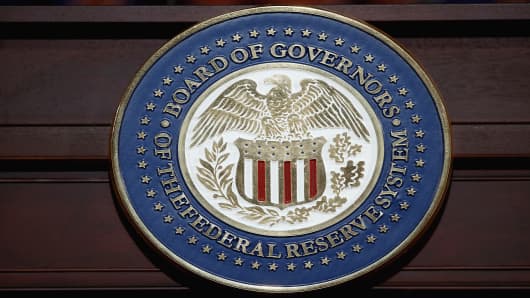In the standard, schoolbook model, increases in the money supply stimulate the economy because they create illusory profits. The demand for goods unexpectedly rises, pushing prices up. Businesses expand to meet this excess demand, hiring new workers, opening shops, and so on. The “extra profits” are invested. Stimulus!
A slightly more sophisticated version says that when interest rates are lowered, this stimulates business investment on the expectation that lower interest rates signal higher savings—which indicate there will be more wealth available for future consumption.
But that didn’t happen this time around. The Fed lowered interest rates down to zero. And then it engaged in quantitative easing twice in an effort to provide monetary policy economic stimulus beyond the so-called “zero bound.”
And none of this worked.
(Or rather, it didn’t work to stimulate the economy. It might have worked to achieve other goals, such as stabilizing the financial system.)
So why has monetary policy become ineffective? The answer is simple: because we all understand monetary policy too well.
Monetary policy can only have a stimulating effect if the rise in prices or fall in interest rates is unexpected and misunderstood.
When monetary inflation is understood and expected, it doesn’t stimulate the economy. Instead, what you get is some version of stagflation.
This stagflation can take various forms. If the excess money reaches consumers, it can result in rising prices with high unemployment. If it sits in the reserve accounts of banks at the Federal Reserve because they won’t lend it out and businesses won’t borrow it, you might not get rising prices at all. It may just find its way into certain types of investments, which results in asset bubbles.
But it’s all stagflation: more money, and weak economic performance.
This analysis is not exactly novel. Indeed, the fact that it has been around for so long but still needs to be explained is depressing. As long ago as 1970, Friedrich Hayek explained that stop-go monetary policy was doomed.
What we are experiencing is still only what in Britain is known as the "stop-go" policy in which from time to time the authorities get alarmed and try to brake, but only with the result that even before the rise of prices has been brought to a stop, unemployment begins to assume threatening proportions and the authorities feel forced to resume expansion. This sort of thing may go on for quite some time, but I am not sure that the effectiveness of relatively minor doses of inflation in rekindling the boom is not rapidly decreasing. The one thing which, I will admit, has surprised me about the boom of the last twenty years is how long the effectiveness of resumed expansion in restarting the boom has lasted.
My expectation was that this power of getting investment under way by a little more credit expansion would much sooner exhaust itself—and it may well be that we have now reached that point. But I am not sure. We may well have another ten years of stop-go policy ahead of us, probably with decreasing effectiveness of the ordinary measures of monetary policy and longer intervals of recessions. Within the political framework and the prevailing state of opinion the present chairman of the Federal Reserve Board will probably do as well as can be expected by anybody. But the limitations imposed upon him by circumstances beyond his control and to which I shall have to turn in a moment may well greatly restrict his ability of doing what we would like to do.
Does anyone doubt that the power of expansive monetary policy is exhausted?
_______________________________________________
Questions? Comments? Email us atNetNet@cnbc.com
Follow John on Twitter @ twitter.com/Carney
Follow NetNet on Twitter @ twitter.com/CNBCnetnet
Facebook us @ www.facebook.com/NetNetCNBC



